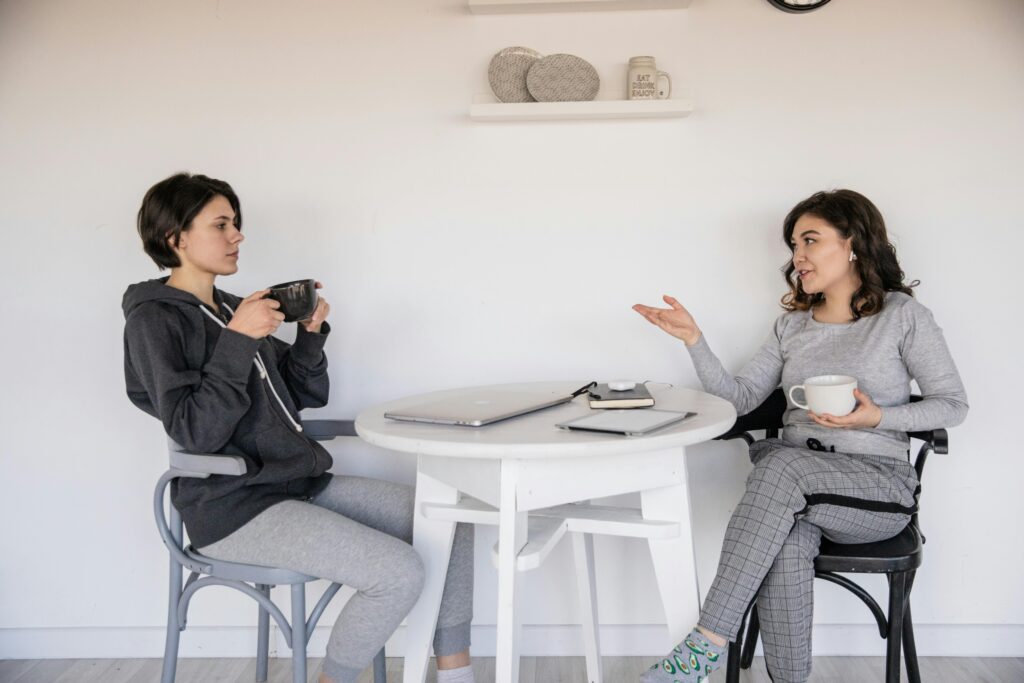
Does Networking Make You Nervous?
Me Too.
Almost all of us have tried it: stepping into a room, probably with a nearby bar, and dozens of strangers looking like they’re comfortable.
They may even look like they know everyone else!
But networking is a necessary “evil” when you’re launching, growing, or sustaining a small business. For me, as an introvert, it can be a hellish landscape.
However, all is not lost! Today, we’re going to go over how to approach an upcoming networking meeting. Time to take notes!
Prep Like a Pro
The Power of Preparation: Before you step into the networking arena, do some homework. Research the event, the type of professionals attending, and the companies represented. If you can, get a list of attendees beforehand and pinpoint a few people you’d love to connect with.
Example: Say you’re attending a local business networking event. Check out the event’s social media pages or website. Look up key attendees on LinkedIn to get an idea of their background. This prep work can give you conversation starters and make you feel more at ease.

The Perfect Pitch
Crafting Your Introduction: Have a brief, engaging introduction ready. This isn’t just stating your job title; it’s about sparking interest. Think of it as your personal mini-commercial.
Example: Instead of saying, “I’m John, an accountant,” try, “Hi, I’m John. I help small businesses turn their numbers into stories that drive growth.” This approach not only shares what you do but also invites curiosity and conversation.
Dress to Impress
First Impressions Count: Dress appropriately for the occasion. Your attire should match the event’s formality and also make you feel confident. Remember, when you look good, you feel good.
However, if it’s a chore to just leave the house, dress comfortably. It’s better to Do The Thing than not do it at all.
Example: If it’s a business casual event, men can opt for a smart blazer and chinos, while women can go for a stylish yet comfortable dress or a professional blouse-and-trouser combo. Comfort is key – if you’re not used to wearing heels, this isn’t the time to start.
The Art of Listening
Engage by Listening: Networking isn’t just about talking; it’s about listening. Show genuine interest in what others have to say. This not only makes the other person feel valued but also helps you understand their needs and how you might be able to help.
Example: If someone is talking about challenges in their industry, listen attentively, and ask thoughtful questions. This builds rapport and shows that you’re not just there to talk about yourself.

Quality Over Quantity
Meaningful Connections: It’s not about collecting as many business cards as possible; it’s about forming meaningful connections. Aim to have a few in-depth conversations rather than several superficial ones (and emailing them afterward!).
Example: Spend more time with fewer people. If you find someone with shared interests or potential business synergy, invest your time in getting to know them better rather than rushing off to the next person.
The Art of Mingling
Mix and Mingle: If you’re at a mixer, don’t just stick to one group. Move around and introduce yourself to different people. This can be daunting, but remember, everyone is there to meet new people.
Something I like to do is literally walk up and wait for someone to notice me. When they do, I joke, “I just figured it’s easier to go up and say hi to people. Hi, I’m Jen!” It usually makes people chuckle. Do I hate doing it? Absofuckinglutely. However, I meet more people this way than most business owners.
Example: If you see someone standing alone, approach them; they might be just as nervous as you are. You can start with something simple like, “Have you been to one of these events before?”
Bring Business Cards
Your Networking Arsenal: Always have a good supply of business cards. They’re still a staple at these events. Make sure they’re up-to-date and professional. I cannot tell you how many people don’t bring enough or bring any at all. Imagine how much you’re leaving on the table!
Example: Hand out your card after you’ve had a meaningful conversation, not right after shaking hands. This makes the exchange more personal and memorable.

The Follow-Up
Don’t Forget to Follow Up: This is where the magic happens. After the event, send personalized LinkedIn requests or emails to those you connected with. Mention something from your conversation to jog their memory.
Example: Send an email saying something like, “Hi Sarah, it was great discussing the future of digital marketing with you yesterday. I’d love to continue our conversation over coffee next week if you’re available.”
Practice Makes Perfect
Keep Attending Events: The more you network, the better you become at it. Attend various types of networking events to build your confidence and skill.
Example: Try attending different types of events like industry mixers, seminars, or local business meetups. Each setting will offer a unique networking experience and help you hone your skills.
Remember to Relax
Stay Calm and Network On: Lastly, remember to relax. Networking meetings are about making connections, not closing deals on the spot. Enjoy the process of meeting new people and learning new things.
Example: Take a deep breath, smile, and remind yourself that everyone is there for the same reason. It’s about building relationships, not immediate business transactions.

What NOT To Do At A Networking Event
Don’t Oversell Yourself
While it’s important to share your achievements and skills, avoid dominating the conversation or turning it into a sales pitch. Networking is about mutual engagement, not a one-sided promotion.
Don’t Underestimate the Power of Listening
Don’t just wait for your turn to speak. Active listening shows that you value the other person’s perspective and fosters a genuine connection. People often appreciate and remember those who give them a chance to share their own stories.
And if you can throw their name in there somehow, even better!
Don’t Forget to Follow Up (But Don’t Be Pushy)
While following up is key, don’t bombard your new connections with excessive emails or messages. A thoughtful, timely follow-up is great, but respect their time and space. Maybe send a Calendly link and give them the option to set up a quick chat!
Don’t Dismiss Anyone as Unimportant
Avoid the mistake of judging someone’s value based on their current position or company. Networking is about building a diverse web of contacts; you never know how someone might contribute to your network in the future.
Don’t Neglect Your Online Etiquette
In the digital age, much networking happens online. Don’t post inappropriate content, engage in arguments, or use unprofessional language on platforms like LinkedIn. Remember, your online persona is an extension of your professional self.
Final Thoughts
Networking might not be a breeze still, but if you follow these steps, it’ll certainly cut down the anxiety!
As a final piece of advice, it might be tempting to have a few drinks, but make sure to slow down. A lot of business professionals have a few too many drinks and don’t make the impression they were hoping to.
If you’re looking for a good resource for business cards, my favorite is Moo.com!